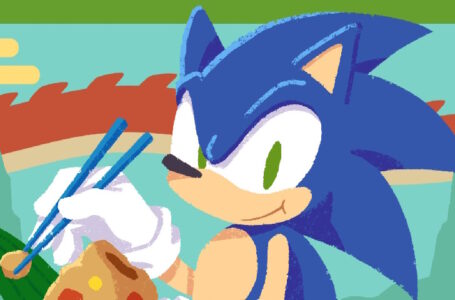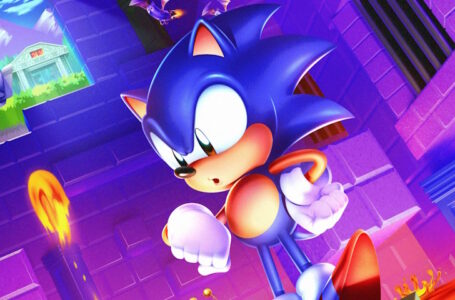The official Olympics games from over the years
As I type this, the opening ceremonies for the delayed Tokyo 2020 Olympics are underway — so what better time is there for a good, old-fashioned retrospective of officially licensed Olympic video games from over the years? There have been quite a few of them, after all — and a fair few of them even hail from Japanese developers.
Most of these games haven’t been re-released on modern platforms due to the Olympic license, so in most cases you’ll need original hardware or emulation to play them. The upside is that sports games are very unpopular with collectors, so you can generally pick most of these up for very reasonable prices — even those on older platforms for which software is starting to get more and more expensive!
Let’s hop, skip and jump right in then…
Track & Field – Konami, 1983
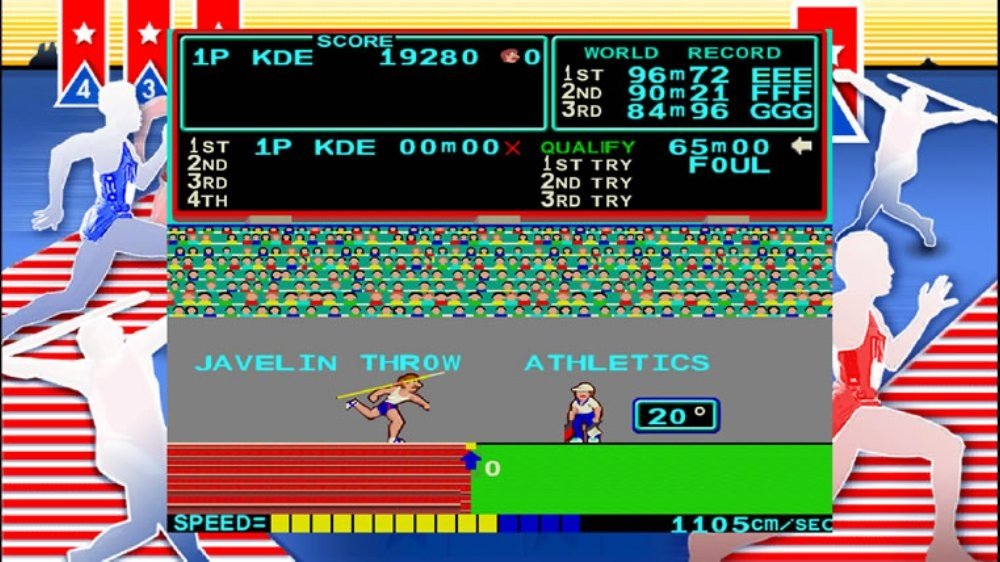
Track & Field, one of the earliest games to establish the joystick-waggling, button-bashing multi-sports formula, was first released in Japanese arcades under the name Hyper Olympic, and sported an official license for the 1984 Summer Olympics in Los Angeles.
Western releases often omitted the Olympic license, hence the name change, though interestingly some of the home ports re-established it — the Atari 8-bit version proudly boasted of being “the official home computer game of the 1984 Olympic Games”, for example.
Track & Field was based around hammering two “run” buttons in order to make an athlete speed up, and some events also required the use of an “action” button to throw something or jump. Such was the abuse that some cabinets took that later models replaced the two buttons with a trackball that could be “waggled” instead; home computer versions instead required players to wiggle their joysticks left and right rapidly.
Track & Field was immensely popular and spawned numerous clones, as well as kicking off a trend of official Olympic and Olympic-inspired video games. Legend has it that its side-scrolling nature even inspired Namco to create its 1984 platform game Pac-Land.
The arcade version of Track & Field is available via Xbox Live Arcade for Xbox 360; note that it is not compatible with more recent Xbox models.
Olympic Gold – Tiertex, 1992
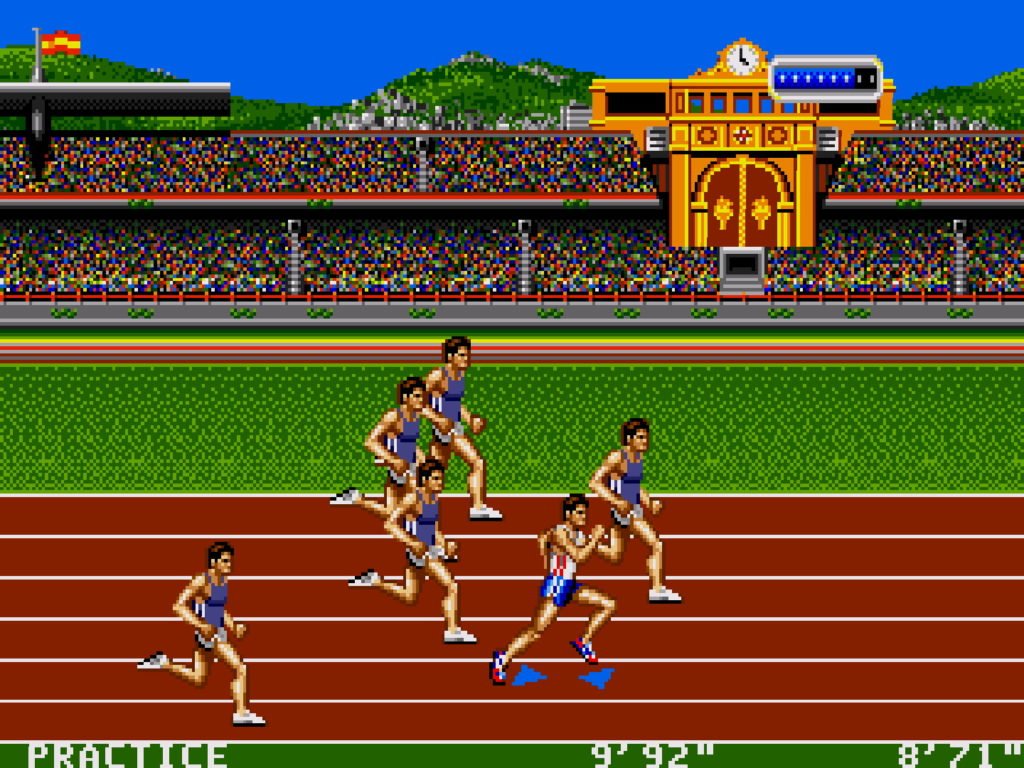
It would be nearly ten years after Track & Field before we got another official Olympics game — this time it came straight to home platforms rather than going via the arcades.
Olympic Gold, the official video game of the 1992 Barcelona Olympics, was a Sega exclusive — it released on Game Gear, Sega Mega Drive and Sega Master System. It was also noteworthy for being one of the earliest examples of a sponsored video game — Coca-Cola’s logo and company jingle appeared throughout the game.
Olympic Gold didn’t stray far from Track & Field’s button-mashing formula, but was noteworthy for including elements other than track and field athletics. Specifically, it also incorporated archery, swimming and springboard diving — each of these demanded more careful accuracy and timing rather than outright abuse of one’s controller!
The game was well-received on its original release, particularly in its Mega Drive incarnation, and is still fun to play today — unfortunately, with its official Olympic license, it’s unlikely to ever see a rerelease on modern systems.
Olympic Summer Games – Silicon Dreams/Tiertex, 1996
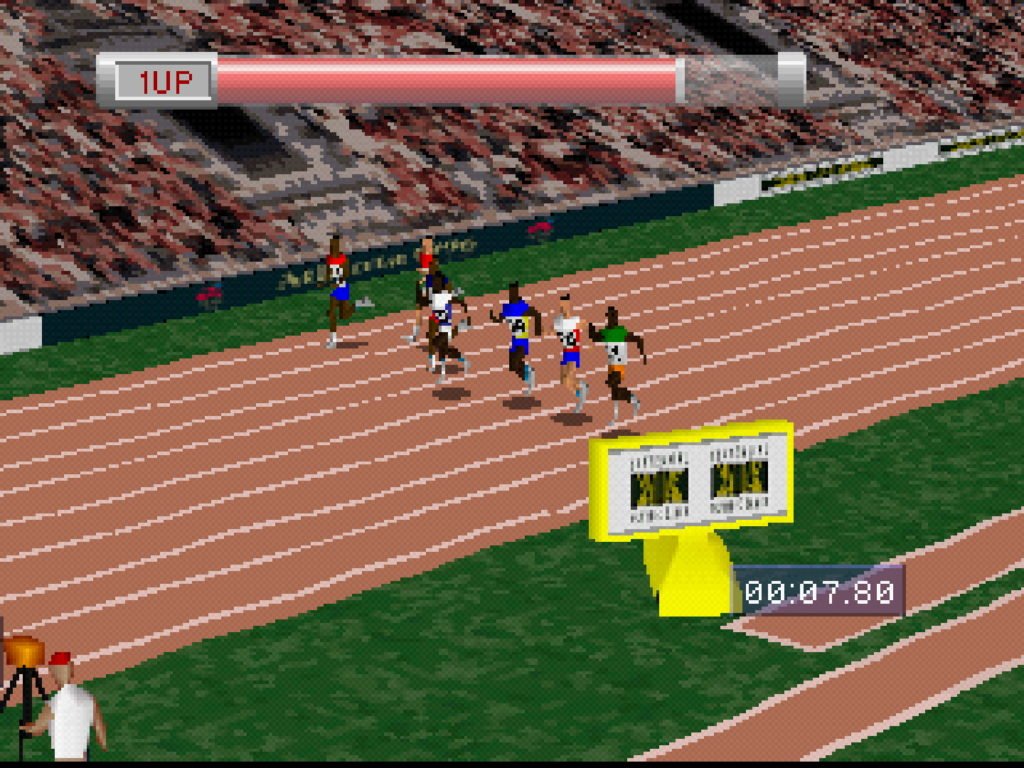
The official video game of the Atlanta 1996 video games was the last Olympics title to be released on fourth generation consoles (including Super NES, Game Boy and Mega Drive this time around) — but it also put in an appearance on Sony PlayStation and Panasonic 3DO. A Sega Saturn version was planned, but never showed up.
This time around, the gameplay was primarily track and field based, with only two events leaving the athletics stadium: archery and skeet shooting. Consequently, the majority of events relied on the tried-and-tested button-mashing formula established by Track & Field.
The game was not particularly well-received in any of its incarnations; the 16-bit versions were criticised for their bland presentation and lack of variety in gameplay, while the PlayStation and 3DO versions were negatively compared to Konami’s International Track & Field, which came out the same year but lacked the official Olympic license. Today, it’s quite fun to look back on as a very early fifth-generation console game!
Sydney 2000 – Attention to Detail, 2000
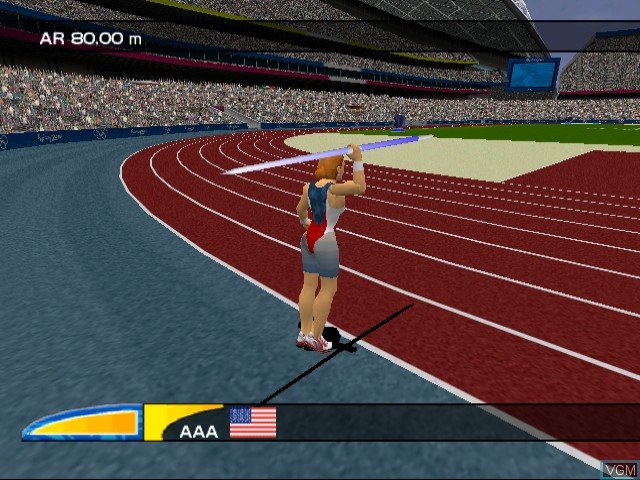
Released for PlayStation, Windows PC and Sega Dreamcast, the official video game of the Sydney 2000 Olympics featured a pleasing combination of the usual track and field events as well as some more unusual inclusions such as weight lifting, cycling and kayaking.
This game was noteworthy for featuring a more substantial “career” mode than many other games of its type — rather than immediately competing in the Olympics, your athlete must compete in qualifying stages and train themselves. The latter aspect involves 20 different “Cyber Gym” minigames, which confer temporary stat boosts — to make these boosts permanent, an event must be completed with a particular score.
This interesting aspect of gameplay was also arguably its biggest downfall; success in the events ended up being more about having the best possible stats rather than actual skill or stamina. This is especially troublesome in the head-to-head two-player mode, which uses the player’s athletes trained in the Olympic mode rather than generic competitors.
The game had a bit of a mixed reception on its original release. Some PC gaming publications were rather snooty about it, believing that it “should have stayed where it belonged — on consoles” (Computer Games Magazine, May 2003) while other outlets praised the game’s solid presentation. Generally speaking, it came in for the same criticisms other games of its type had — a lack of depth and long-term appeal.
Athens 2004 – Eurocom, 2004
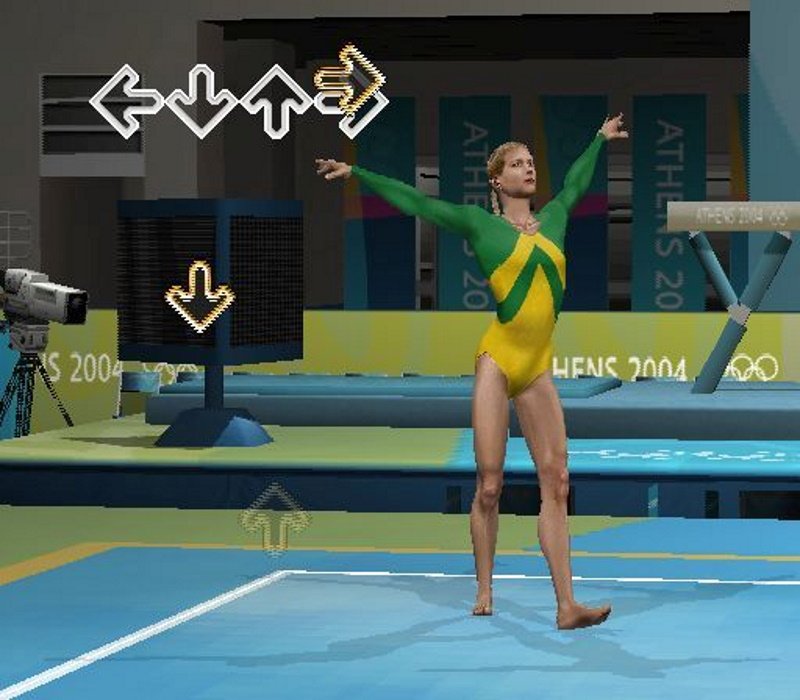
The official video game of the Athens 2004 Olympic Summer Games was released exclusively for PlayStation 2 and Windows PC, with Sony themselves publishing the console version. The PS2 version is the superior version, as it includes two disciplines that are not present in the PC release — gymnastics and equestrian.
Athens 2004 features a wide variety of events including both the usual track and field events as well as a variety of other sports. Each discipline has multiple subcategories, too — for example, in swimming there are individual events for four different strokes, while gymnastics features floor exercises, still rings and vault.
The game was noteworthy for featuring one of the widest possible selections of playable countries in any official Olympics game to date — the player could represent any of 64 different countries. Once again, however, the game had a somewhat mediocre reception; its solid presentation and multiplayer action was praised, but the usual criticisms of a lack of depth, customisation and longevity were trotted out once again.
It does have dance mat compatibility, though!
Mario & Sonic at the Olympic Games – Sega, 2007
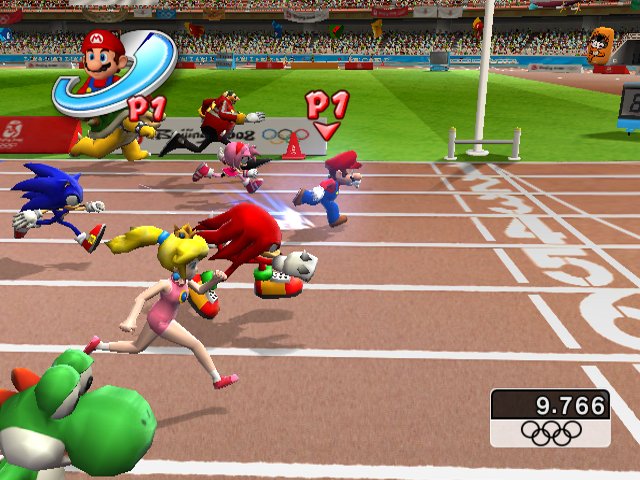
Developed by the Sega Sports R&D Department, this was the first installment in the crossover Mario & Sonic series, and came out for Wii and DS. It features 24 events, including a selection of fantastic “Dream Events” based on Mario and Sonic games. The exact lineup of events varies slightly according to platform — the DS version has more Dream Events than the Wii version, for example, while the Wii plays host to relay races and rowing.
As you might expect from a Wii game from 2007, there’s a strong emphasis on motion controls in this one — though the variety of different events means that you’re not just waggling. The trampolining event, for example, involves both twisting the remote and pressing button combinations to perform tricks.
The game was a commercial success and actually had a fairly positive reaction from critics who were normally down on official Olympics games; praise was heaped on the solid use of the Mario and Sonic characters, as well as the game’s party atmosphere, though it also drew criticism for the imprecise and sometimes non-intuitive motion controls.
Beijing 2008 – Eurocom, 2008
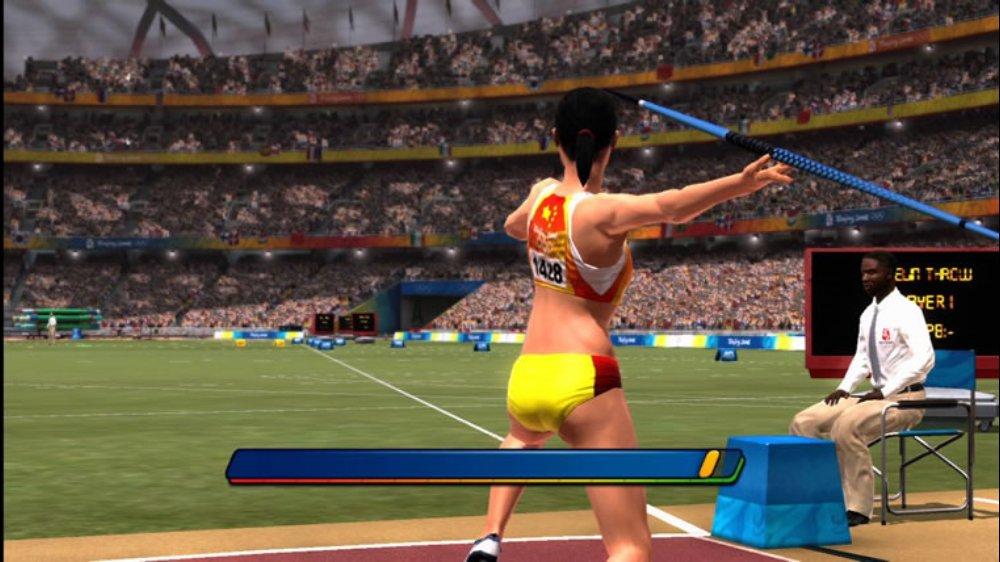
Developed by Eurocom and published by Sega, the official game of the Beijing 2008 Olympic Summer Games was actually the second game based on the event; the first was Mario & Sonic at the Olympic Games. While that game came out for Nintendo platforms, however, Beijing 2008 was for Windows PC, PlayStation 3 and Xbox 360.
Beijing 2008 features an impressive variety of 38 different events, including the ability to compete in a decathlon or heptathlon, a selection of 5, 10 or 20 random events, or all of the events in succession. There’s also an online mode, though good luck getting a game on that these days.
As usual, the game drew criticism for its “button-mashing” gameplay and relative shallowness; however, it’s worth noting that the game does feature a career mode similar to that found in Sydney 2000, and the wide range of events gives this a lot more longevity than many other similar titles.
Beijing 2008 is still listed on the Xbox online store, but no longer appears to be available for purchase.
Mario & Sonic at the London 2012 Olympic Games – Sega, 2011
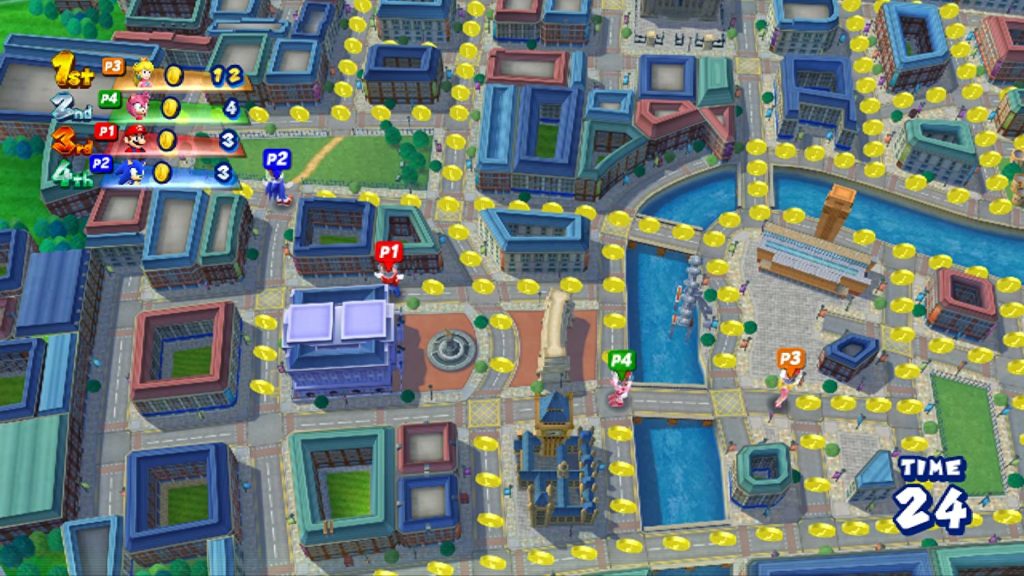
After the success of the first Mario & Sonic at the Olympic Games, it was only natural that Sega would follow up with a sequel. A second sequel, actually; 2009 played host to Mario & Sonic at the Olympic Winter Games for Wii and 3DS.
Like its predecessor, Mario & Sonic at the London 2012 Olympic Games features an interesting variety of events rather than sticking to old faithful track and field challenges. Team sports such as football and volleyball are included, as well as one-on-one competitive challenges such as badminton and table tennis. The “Dream Events” system was also expanded with cooperative gameplay mechanics — and the 3DS version even includes a full-on story mode.
Once again the game was popular with consumers but had a mixed reception from critics; the most common criticism was a lack of overall difficulty, though this can be somewhat mitigated by playing with friends rather than against the computer. The new “London Party” mode, which combines board game mechanics and sticker collection with the Olympic events, was singled out for particular praise, however.
Collectors may be interested to note that this is the only Wii game that was released in a yellow DVD case rather than the usual white, meaning it will stick out like a sore thumb on your shelf. Enjoy that!
London 2012 – Sega, 2012
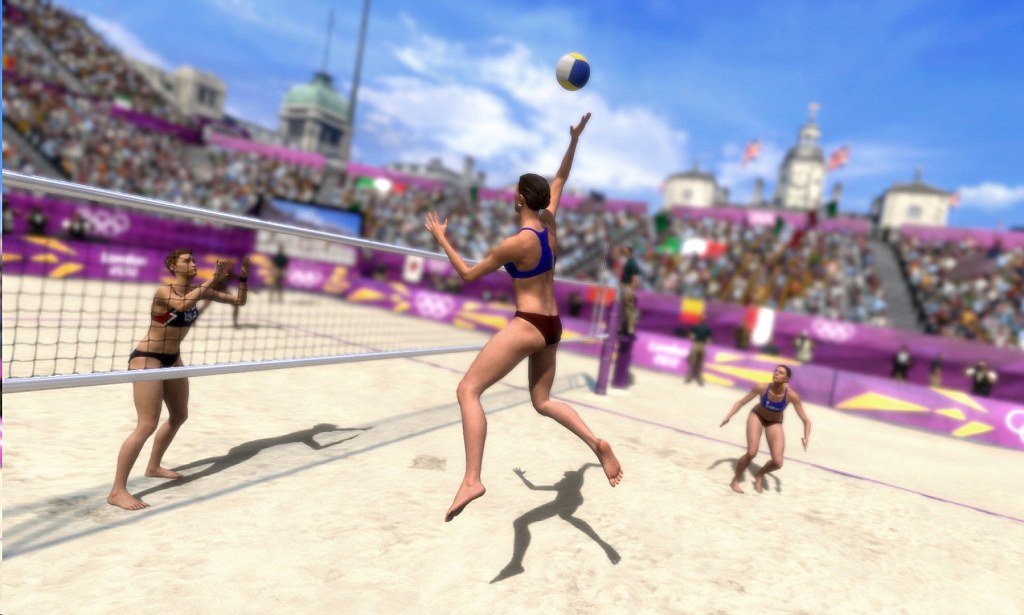
This was the first Olympics game to be developed in-house by Sega — specifically, Sega’s Australian studio, formerly known as Creative Assembly’s Australian branch. It features 31 different events, and is noteworthy for incorporating a number of cooperative rather than competitive multiplayer events. You can play it on PlayStation 3, Xbox 360 or Windows PC; it was also available on the failed cloud gaming platform OnLive while that was a thing. Remember OnLive? Didn’t think so.
The game features an impressive array of different events, including the usual track and field suspects plus a wide range of aquatic sports, multiple types of archery and shooting, beach volleyball, canoe slalom, rowing and weightlifting.
The game’s online mode featured a “National Pride” ranking system where players would collectively obtain medals for their country of choice; as with most other games from a few years back, don’t expect any meaningful competition online these days, however.
Unusually for an Olympics game, London 2012 actually received reasonably positive reviews from a number of critics, who praised the variety of events and the subtleties of the control mechanics throughout the game. Sega’s intention very much seemed to be to get away from typical button-mashing mechanics and provide something a bit more interesting for players to do — and they largely succeeded in this task.
Mario & Sonic at the Rio 2016 Olympic Games – Sega, 2016
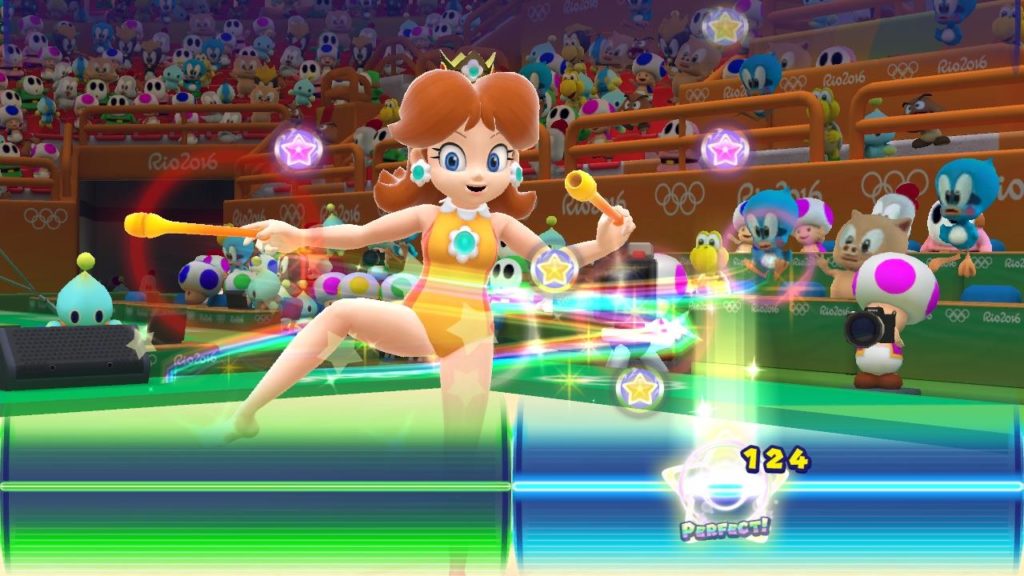
The second of the Mario & Sonic games to be released on Wii U, Mario & Sonic at the Rio 2016 Olympic Games features 34 playable characters but a seemingly lacking 14 events; the game as a whole does feature something of an expanded “metagame” for the solo player, however, meaning it has a certain amount of longevity and depth not present in some other Olympics games.
This Mario & Sonic game replaces the Dream events from previous installments with new Duel events, where special items drawn from Mario and Sonic games can be used, and specific actions can be used to build up a Duel Points meter for bonus scores.
The game seems to be largely forgotten in comparison to the other Mario & Sonic games out there — it enjoyed a reasonable critical reception on its original release for its solid gameplay and multiplayer action, though its relatively limited selection of events compared to previous installments was often criticised.
Olympic Games Tokyo 2020 – The Official Video Game – Sega, 2019
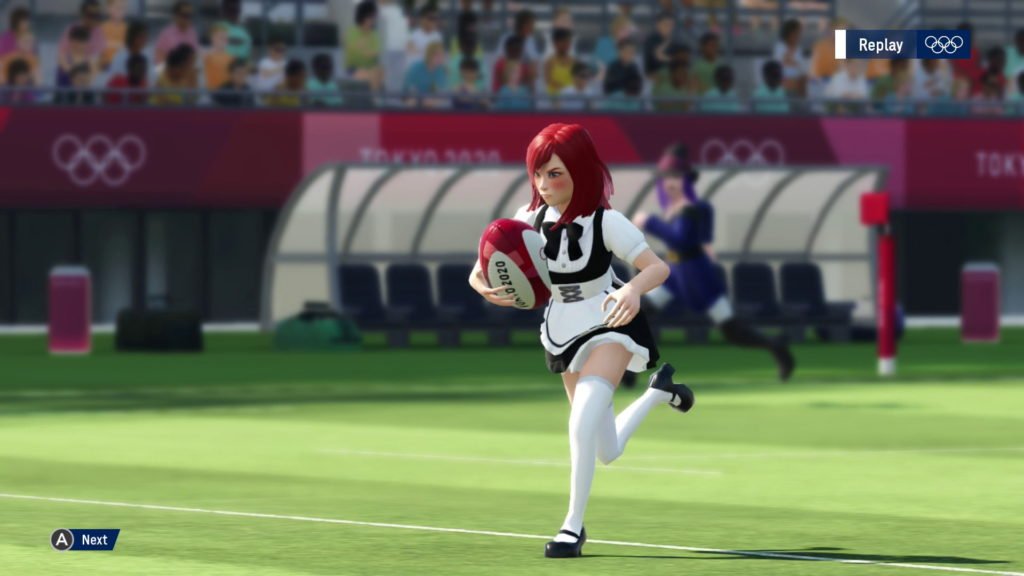
Rather optimistically released out east for Nintendo Switch and PS4 in 2019 before creepy uncle COVID paid us all a visit, the official video game of the Tokyo “2020” Olympics was developed internally by Sega — and is a damn good game, to boot.
With questions raised over whether or not the Olympics would be happening at all, Olympic Games Tokyo 2020 – The Official Video Game was held back from a localised release for some time — though the Japanese and Asian releases featured full English support. Once it became clear that the Games would be going ahead — albeit rather late — Sega unleashed it on the rest of the world, as well as porting it to Xbox One, Windows PC and definitely-not-another-OnLive streaming platform Google Stadia.
Olympic Games Tokyo 2020 – The Official Video Game doesn’t take itself seriously at all, with a huge degree of athlete customisation, a wide variety of silly costumes to collect and some distinctly exaggerated arcade-style gameplay. Several of the events in the game — particularly the team sports — would work well as standalone sports games, and a wide variety of ways to play means that this one will keep you busy whether you’re playing solo or with a friend.
Sadly, the game only offers two-player local multiplayer, making it less of a “party game” than some other earlier Olympic titles, but up to four people can compete against one another through the online modes. An interesting “Ranked” system features an Olympic-style schedule of events taking place at specific times — though at the time of writing it’s still a bit tricky to find a match against other players.
While it may lack in the realism stakes and would have probably benefited from a more substantial “career” mode, this is definitely one of the best Olympics games for quite some time; if nothing else, it’s worth it just to be able to play rugby with an entire team dressed as pretty princesses.
You can try Olympic Games Tokyo 2020 – The Official Video Game for free on Steam this weekend (until 26 July, 2021). It’s also available on Switch, PS4 and Xbox One.
Mario & Sonic at the Olympic Games – Tokyo 2020 – Sega, 2019
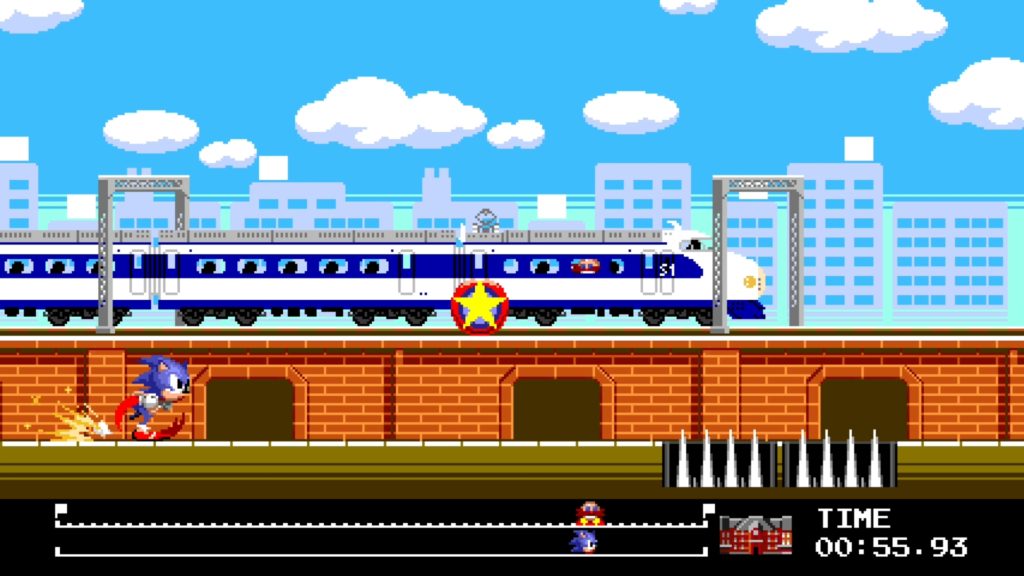
Released towards the end of 2019 worldwide, the first installment of the Mario & Sonic series to hit the Nintendo Switch is noteworthy for blending the modern polygonal presentation of its predecessors with 2D pixel art events featuring 8- and 16-bit style sprites. This latter aspect has come in for particular praise for successfully recreating the feel of Konami’s classic Track & Field.
The game features a story mode where the player, in cooperation with Mario, Sonic and friends, must thwart Eggman’s attempts to do his usual evil business — this time with a time-travelling video game system — and the 2D events tie in with this.
New events include karate, skateboarding, sport climbing and surfing — a couple of these are nice callbacks to non-Olympic sports games such as Epyx’s classic California Games.
The game had a reasonable critical reception, but drew criticism for its somewhat lacking multiplayer options, laggy online multiplayer and lack of replay value for the solo player after beating the story mode.
Mario & Sonic at the Olympic Games – Tokyo 2020 is available for Nintendo Switch.
What are your favourite Olympic or Olympic-themed games from over the years? Let us know in the comments — or pen us a letter for the Rice Digital Friday Letters Page!
Join The Discussion
Rice Digital Discord
Rice Digital Twitter
Rice Digital Facebook
Or write us a letter for the Rice Digital Friday Letters Page by clicking here!
Disclosure: Some links in this article may be affiliate links, which means we may earn a small commission if you make a purchase after clicking on them. This is at no additional cost to you and helps support Rice Digital!
- Letter from the Editor: passing the torch - June 30, 2023
- Super Woden GP 2 is looking promising - June 30, 2023
- Inti Creates is making a 32 bit-style Love Live action platformer - June 26, 2023





